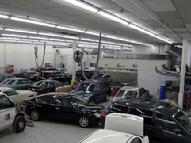When a vehicle’s brakes are working properly, you don’t give them a second thought. However, if something does go wrong, you cannot ignore the issue. Brakes should always be in top working condition. The following factors may indicate that there is something wrong with your brakes.
Noises
Some vehicles have built-in wear sensors. When the lining needs to be replaced, the sensors scrape against the brake disc, making an irritating screeching sound as the vehicle brakes. Whether or not your vehicle has these sensors, it is still important to listen for squealing, squeaking, grinding and other noises that may indicate wear. Sometimes cleaning the brakes takes care of minor issues. Generally loud, continual noises indicate worn parts.
 Brake warning light
Brake warning light
All vehicles are equipped with a brake warning light; it will come on for a few seconds upon starting the vehicle. If it does not shut off as you start driving, most likely the brake system fluid level is low. This may be due to a leak or an issue with the brake master cylinder. Note that the brake warning light is not the same as the warning light that switches on when the foot- or hand-operated parking brake is applied.
Decreased responsiveness or fading
There may be a leak in the braking system if the pedal “sinks” to the floor or the brakes are not as responsive as normal. The leak can be an air leak in the brake hose or a brake fluid leak. Do you notice a small fluid puddle when the car is parked? Fluid puddles are a clean indication of brake fluid leaks. The fluid will have a similar appearance to that of fresh motor oil, but the texture will not be as greasy.
Pulling
If the vehicle pulls to one side or the other while you’re braking, the brake lining may be wearing unevenly or there could be a foreign substance in the brake fluid. In the event of a vehicle pulling, consult with a mechanic about having the brake fluid drained and replaced or getting the brakes adjusted.
Vibration
A pulsating or vibrating brake pedal is often a sign of warped rotors. It will feel similar to stopping a vehicle with anti-lock brakes suddenly. If the brakes are not the cause of this issue, you may have an alignment problem.
It is important to keep in mind that the amount and type of driving that you do largely dictates how often you have to replace your brakes. Typically, you use the brakes a lot more during urban driving than rural driving. An individual who drives 10,000 miles per year commuting to and from work in Chicago will need to replace his brakes more often than an individual who drives 30,000 miles per year on rural roads in Iowa. When you take your car in for a routine tire rotation, have the mechanic inspect the breaks as well.
Collision 24 is the place to go in the greater Brockton area for collision repair. We have a state-of-the-art facility where we offer computerized frame repair and paint matching for all vehicle makes and models. With on-staff collision specialists and licensed appraisers, you get peace of mind knowing that your vehicle is in professional hands. Collision 24 also boasts on-site rental vehicles and 24-hour towing.
We are located at 97 Manley Street in Brockton, just off of US-24 at exits 17A/B. Our facility is open 7:30 a.m. to 5:30 p.m. Monday through Friday and 8:00 a.m. to 12:00 p.m. Saturday. If you’re in need of collision services, give us a call at 508-586-2010. You can also easily schedule your appointment online!
